#homestuck fanwork
Text
vriska doing the caramelldansen!
so- its a bit messy and took about five hours?? i dont think im going to animate again for a while.
made using mspaint and a mouse to draw
reblogs would be appreciated! :,D
#homestuck#homestuck art#homestuck fanart#homestuck vriska#vriska serket#hs vriska#vriska hs#vriska fanart#vriska homestuck#homestuck fanwork#homestuck animations#homestuck animation#first animation#animation meme#caramelldansen#homestuck trolls
72 notes
·
View notes
Text
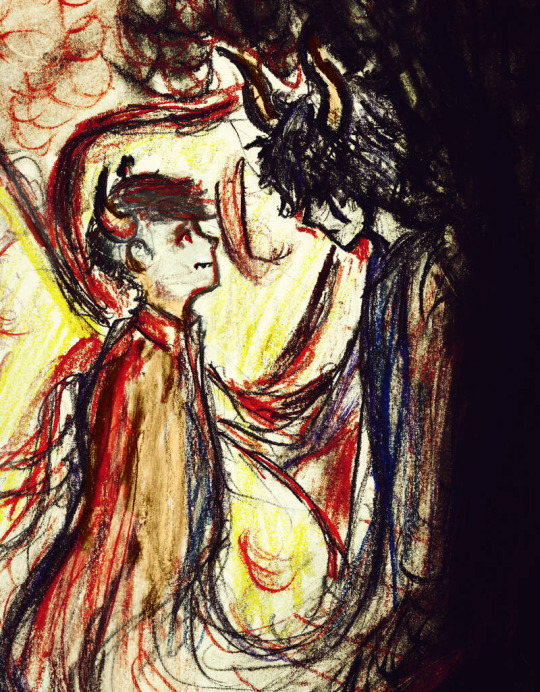
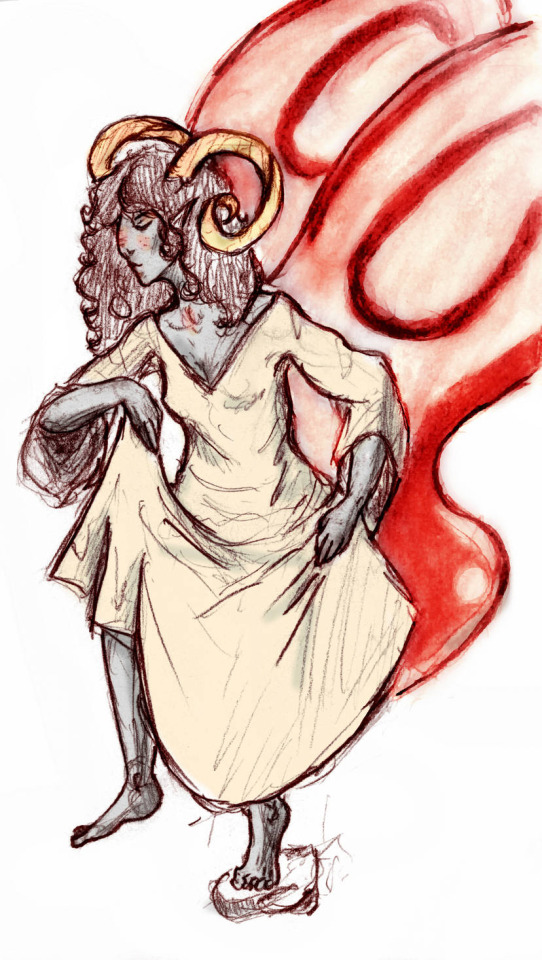
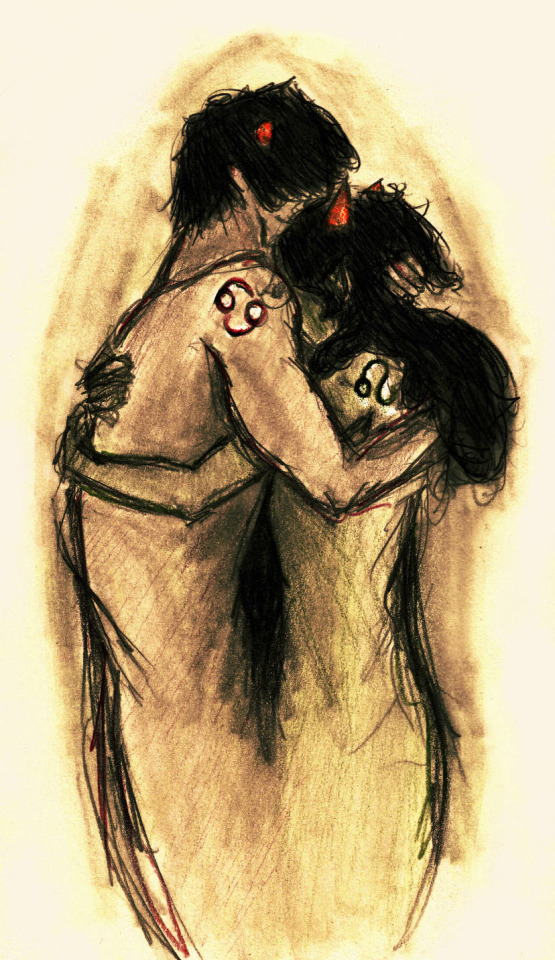
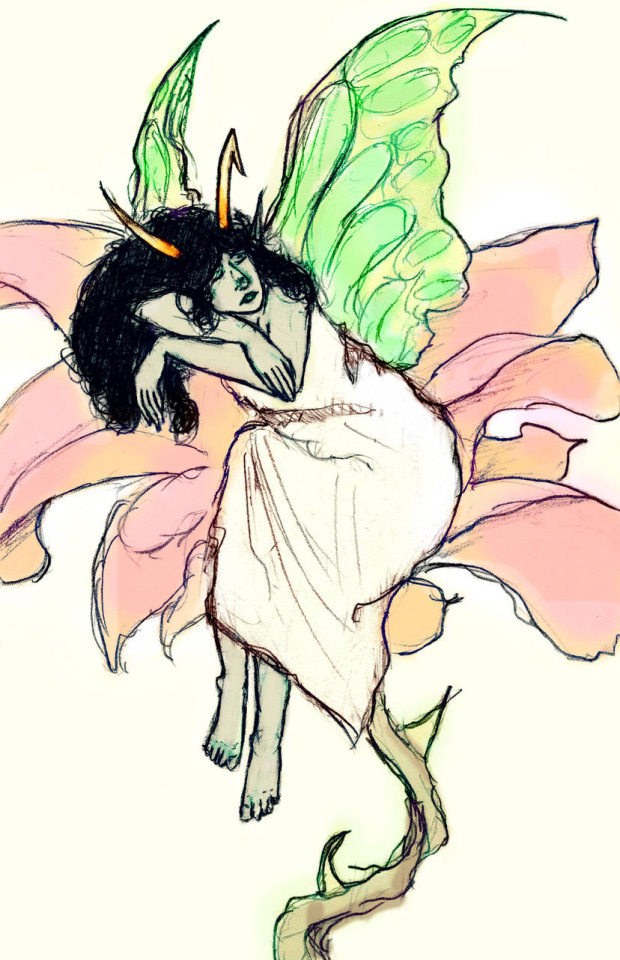
Found my old deviantart and a lot of it was cringe but some of it was cute- so here’s some old homestuck art from when I 16 (I’m 26 now and am tempted to do some redraws to compare)
#homestuck#hamsteak#homestuck fanart#homestuck fanwork#traditional art#gamzee makara#homestuck gamzee#gamzee fanart#gamzee x tavros#karkat vantas#aradia megido#kanaya maryam#nepeta leijon#old art
24 notes
·
View notes
Text
Homestuck rarepair sketches?? On MY tumblr? It's more likely thank you think!
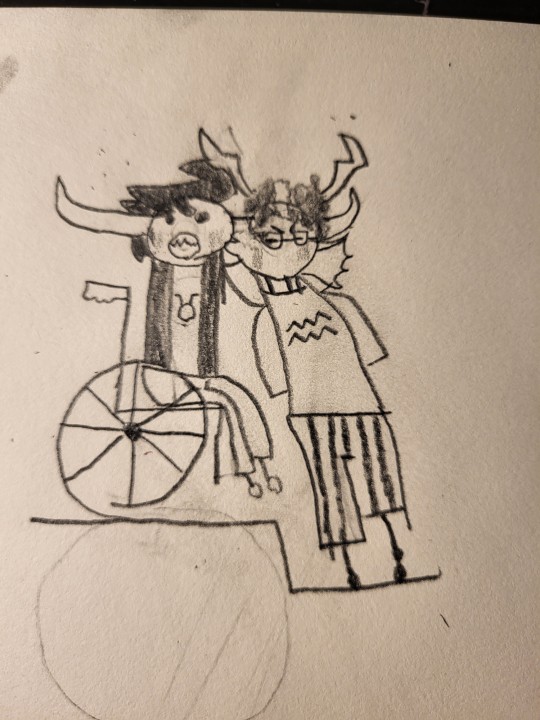



#vriska x roxy#tavros x eridan#surf n turf#kanaya x feferi#roxy x vriska#eridan x tavros#federi x kanaya#feferi peixes#homestuck feferi#kanaya maryam#homestuck kanaya#vriska serket#homestuck vriska#vriska#feferi#kanaya#tavros nitram#tavros#homestuck tavros#eridan ampora#eridan#eridan homestuck#roxy lalonde#roxy homestuck#roxy#homestuck fanart#homestuck fanwork#homestuck#theyre a little goofy but i really like em!#im just starting to practice sketching so any suggestions are reallt helpful!
21 notes
·
View notes
Text
Here, at last, is that thing I keep talking up: my Homestuck rewrite doc itself, a list of the changes I would make (with illustrative page links), heavily inspired by the works of @thelifetimechannel, @meraki-sunset, and, to a lesser extent, @friendlybatteringram and @act8official. https://docs.google.com/document/d/1yvangCLo3QIyuCvjWL6pu_fTQXaZFa3F6BS0_rHT5dc/edit?usp=drivesdk. Featuring more God-Tiers, Karkat Doing Things, June Egbert, Ultimate Jade, Cherub Lore rewrites, Eridan Doing Things, Nepeta Doing A Few Things, Feferi causing Game Over, slightly more Tricksters, nothing known beyond the final threshold, and more. Approximated to end up at around 8400 pages.
Edit: big rewrite pending, should be up by 6/12/24.
#homestuck#rewriting homestuck#Calliope#crow strider au#double death of the author#karkat Vantas#beta kids#alpha kids#beta Trolls#june egbert#jade harley#jane crocker#jake english#caliborn#crow strider#feferi peixes#peregrine mendicant#menardism#act 8#rose Lalonde#eridan ampora#nepeta leijon#homestuck fanwork#the condesce#tlcstuck#dave strider#vriska serket#terezi pyrope#davesprite#dirk strider
14 notes
·
View notes
Text
theater of roxy
[s]: begin
#homestuck fanwork#homestuck#roxy lalonde#calliope homestuck#dirk strider#jake english#jane crocker#ult roxy#ult calliope#ult jane crocker#ult jake english#animation#amv#epilogues compliant#yippeee
13 notes
·
View notes
Text
The Skaian Pantheon (official promo post)
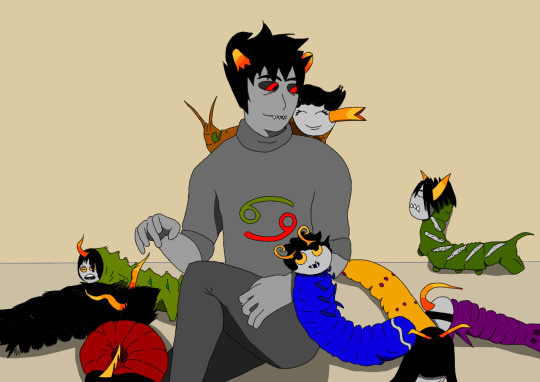
What if, after they achieved their victory, the kids decided not to skip forward five thousand years?
Not a very original concept on its own (I know that now) but let me put it another way: What if they embraced their roles as gods, terrifying though it might be?
What if, at the end of the old worlds and the beginning of a new one, there was a single city, and three species to inhabit it? What if the unique burdens of a race created to start civilizations were explored? What if there were fourteen survivors, all young adults struggling with terrible responsibility and traumatic events? What if they leaned on one another for support?
You get a timeline specifically catered to me, is what. Apparently other people enjoy it too, if you're inclined to give it a read.
#homestuck#fanfiction#homestuck fanart#homestuck fanfic#homestuck fanwork#fanwork#fanfic#ao3#beta kids#beta trolls#alpha kids#calliope#homestuck fanauthor coalition#Skaian Pantheon#aka Luna's Earth C Sandbox#but I'm not Luna anymore lol
9 notes
·
View notes
Text
A new post canon adventure? In this economy?
Alternate Save is a new adventure that takes place right after the events of Act 7 and takes a different path than the epilogues. If you like some character driven stories that hopefully hit that classic mix of silly Homestuck humor and serious character moments. Watch the now adults of Earth C as they navigate friendships, relationships, and coping with the long lasting scars from Sburb.
Thank you again to the talented work from @meraki-sunset who I couldn't have uploaded this without. I've been super excited to push this mspfa live for a while now and I'm happy to finally do so!
#homestuck#hom3stuck#mspfa#Homestuck post canon#alternate universe#Alternate save#Beta kids#Homestuck fanwork#Rose Lalonde#John Egbert#Dave Strider#jade harley
4 notes
·
View notes
Text
youtube
Psyched for this, pls give some support
0 notes
Text
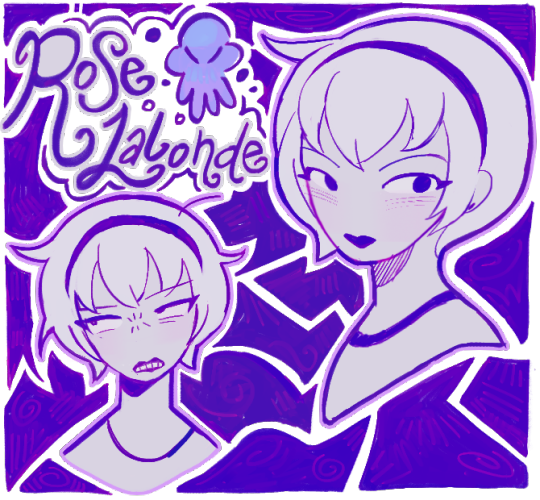
fandom art? on MY blog...
#digital aritst#artists on tumblr#digital art#art#fanwork#fanart#homestuck#homestuck fanart#rose lalonde#hs rose lalonde
2K notes
·
View notes
Text
Have I posted this before? I don't think I did.
Peep the 8ugwife
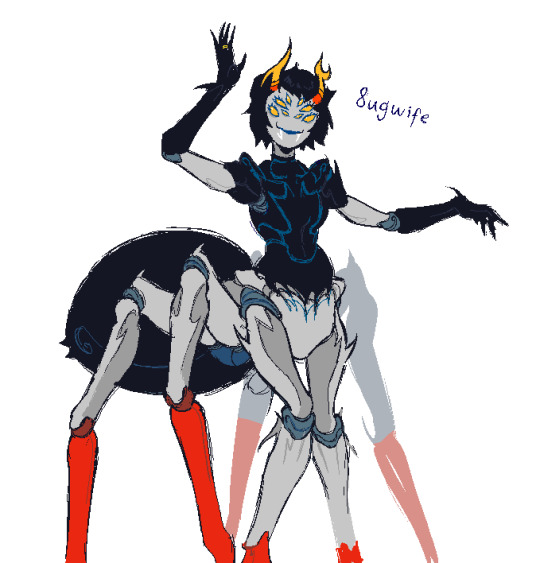
#hom3stuck#aranea serket#fanart#super old art lol#homestuck#homestuck art#homestuck fanart#dancestors#hs aranea#aranea fanart#homestuck au#my art#digital art#fanwork#artwork#homestuck aranea#serkets
456 notes
·
View notes
Text
CLASSES - a comprehensive guide
The first thing that needs to be said is that there is no such thing as a "bad" class. All of them have the potential to be a great detriment OR great boon to the rest of the team, depending on how far along the journey of self-actualization a party member is. Some may have steeper challenges, but this corresponds with greater rewards.
The second thing that needs to be said is that all players are part of a team, and all personal journeys and playstyles are interlinked. No class is truly "solo." Even the smallest viable session is still two people, and even the most suitable classes for solo play are stronger when they're in a party.
The last thing that needs to be said is that the game wants you to succeed. The game, inherently, wants every player to reach godhood, wants every player to self-actualize, wants every player to win. It respects free will and free choice, so it will allow for failures (and, indeed, doomed timelines are vital to the alpha one existing), but Skaia is ultimately optimistic, and tries at every turn to ensure that a golden ending is possible.
Because, after all, SBURB/SGRUB - and Homestuck itself - are about children growing up, maturing, and learning compassion for each other. About fixing their flaws and rejecting the negative aspects of the society they came from. It's about how it is our duty, our responsibility, to become kind, mature people who care about one another, because we will one day be responsible for creating a new society.
And so, without further ado:
ACTIVE (-) Classes and PASSIVE (+) Classes are described with the dichotomy of "powers working for the self" vs. "powers working for others," but I believe this to be an oversimplification of what the active and passive split is. Both active AND passive classes benefit from being in a party; however, an active class will gain fewer party benefits in exchange for being more suited for solo play, while a passive class will be less suited for solo play, but confer much greater benefits to party play.
This is reflected in their personal quests: while active classes and passive classes will both require intervention, empathy, and guidance from their teammates, the struggle of an active class is usually one of grappling with internal flaws, and the struggle of a passive class is one of grappling with interpersonal or societal relations. In other words, the personal quest of an active player will usually involve getting therapized, while the personal quest of a passive player will usually involve addressing a systemic societal issue. Often, both will be required, but whether a class is active or passive will indicate an area of focus.
KNIGHT - / MAID +
PARTY MANAGEMENT
one who wields [aspect] or leads with [aspect] / one who distributes [aspect] or manages with [aspect]
KNIGHTS (-) are a very flexible and versatile class; "wielding" their aspect does not necessarily mean they are skilled at DPS. It actually indicates the way a knight interacts with their aspect, a very straightforward relationship of tradesperson and tool, or soldier and weapon. Similarly, while a knight does not always take up the "leader" position in the party, they will be the "spearhead," a point behind which the other players rally, a beating heart keeping the party together.
This straightforward relationship between a knight and their aspect leads to knights finding little difficulty mastering their aspect once they've begun. Many knights are, in fact, instinctively drawn toward utilizing their aspect, in the same way that they are naturally drawn toward roles of importance or heroism.
Knights often struggle with their perceived place in society, as well as with their innate sense of self and self-worth, seeing themselves as outcasts, resenting the responsibility placed on their shoulders, and fearing vulnerability. Unaddressed, these issues will lead to knights who actively become a detriment to party success. For example, they can dismiss valid concerns, shirk their duties, and in the worst case scenario, actively lead the party down the wrong path, invoking their natural ability to lead for ill.
Therefore, a knight's journey is one of accepting themselves and accepting their duty to better the world. It is about coming to terms with their own insecurities and learning to rely on others. It is about learning to take responsibility, and accepting the banner of a just and glorious cause.
A fully realized knight will be the center of every charge, the guiding star behind which the other players rally. They can provide clarity and guidance to those still on their journeys, and peace and comfort to those who are struggling or in pain. Where the knight goes, the party will follow, as a unified and united front.
MAIDS (+), meanwhile, tend to be on the backlines. If the knight is the forward march, then the maid is the supply line, an incredibly vital role whose absence is disastrous, even if its presence is nearly invisible. Maids have a nearly infinite well of their aspect to distribute, and are uniquely talented at managerial duties - keeping players on task, patching up the holes in a plan, sourcing and supplying resources, so on and so forth.
This is not to say that maids are relegated to support roles - a maid is usually capable of holding their own in combat just fine, especially if they've been endowed with a more combat-suited aspect. Both knights and maids are extremely versatile. That being said, maids truly shine when they're able to take on these backline roles, and many maids are more noticeable by the devastating effects of their absence rather than the invisible touch of their presence.
However, they are the class that most often starts in subservient conditions - low status, strict duties enforced upon them, so on - and their personal journey is a constant struggle against the control of others. Maids whose parties fail to grapple with and undo these shackling forces will find their maids succumbing to the influence or control of malicious entities; in the worst-case scenario, a maid can become an actively hostile enemy or saboteur, invisibly pulling the party's strings and setting them up for failure.
Therefore, a maid's journey is about rejecting societal oppression and throwing off the chains that bind them. A successful maid rises to become the head of the household - nothing occurs within the game that does not first pass the maid's inspection, and their touch ensures that there is a place for everything, and everything is in its place.
A free maid, who belongs to themselves, incomparably increases a party's efficiency. Every communication line is clear, every distribution route is clean, every mystery is solvable, and every plan is airtight. A maid guarantees that nothing can ever go too wrong.
PAGE - / HEIR +
TEAM BONDING
one who must earn [aspect] or inherits the mantle of [aspect] / one who is beloved by [aspect] or awakens to [aspect]
PAGES (-) start the game with the fewest benefits from their aspects, but the greatest potential for growth. Theirs is a constant battle with the self; they are often cowardly and naive. They possess sensitive souls, and while it is incredibly easy to hurt a page, it's much more difficult to build them up. Because of the difficulty of raising this class, it's practically defined by its journey - a constant struggle against the self - rather than its destination, and the powers the class confers.
Pages, like heirs, are classes of inheritance. A page is promoted by trials and tribulations and comes to inherit a greater power than they begin with; in the same way, the class will one day come to embody its aspect, although the road will always be turbulent and long. Moreover, it is a journey without end; pages, being as sensitive as they are, are the most prone to backwards progress, even after reaching their peak.
They prone to staying weak throughout the entire game, never self-actualizing past being the party joke. They attract the obsession and ridicule of stronger-willed players, and their mistreatment can become extremely divisive. A page can easily become a party's albatross, the epicenter of massive interpersonal conflicts, which can tank an entire session.
Therefore, a page's journey is one of the most difficult of all - that of teaching others how to care about other people. Pages rely on great patience, kindness, and understanding. Their sensitive souls must be carefully nurtured and propagated with love and attention. In the same way that a page can tear a team apart, they can bring a team together, all in the name of compassion and empathy. A fully-realized page is the symbol of a party that has linked hands with one another.
Self-actualized pages, as a result of the difficulty inherent to the class, are incredibly powerful and versatile when fully realized. Inheriting the mantle of their aspect, they become pure embodiments of their aspect, capable of achieving impossible feats of raw, unfiltered power, and inspiring all those who gaze upon them.
HEIRS (+) begin the game very strong, but have a difficult time becoming stronger. This is because their usage of their aspect is very instinctual to them, even at times being entirely beyond their control, hence, "beloved by" in the class description. However, because of how naturally their aspect comes to them, it makes taking further command of their powers difficult.
An heir "awakens to" their aspect because their natural, intuitive control often renders them too comfortable to grasp the greater implications of their class. As an inheritance class, heirs can come to embody their aspect, transforming entirely into it. Their challenge lies in breaking out of their comfortable shell and learning how to utilize their powers in more active, intentional ways.
This is reflected in their personal quests. They are often set to inherit great privilege or wealth prior to entering the game, and are thus naive to the realities of the suffering and pain of others. Without a supportive party willing to challenge their views, heirs can perpetuate that pain by submitting to their place in the world, becoming a divisive force within the party, or, in the worst case, losing themselves to their inheritance, and submitting so wholly to their aspect that they become lost to the rest of the team.
Thus, an heir's journey is to question the stratification of the society they belong to, so that they can recognize and address its flaws. They must learn to interrogate their inheritance, separate it from themselves, and reconcile with it. Theirs is an arc of examination and understanding, descending from their position of privilege and peace to learn about the suffering of others, and deciding that they wish to do something about it.
With full command over their aspect, and a clear vision for how it ought to be distributed, the party gains a new and powerful ally - the aspect itself, which will come to embrace the entire party as family. A fully-realized heir connects the privileged and underprivileged, spreading their inheritance to all.
MAGE - / SEER +
GUIDANCE
one who invokes [aspect] or is drawn to [aspect] / one who comprehends [aspect] or is guided by [aspect]
MAGES (-) are a class of prophets, although saying they "see the future" is misleading. Rather, mages "invoke" the future, collapsing causality to align to their desires. Most mages remain unaware that they are doing so until well into their journey. While all players weigh on the scale of causality, affecting both past and future events, and which sequence of events is the "alpha" sequence, mages have the most direct effect.
Because of this ability to invoke future events, mages possess powerful buffing/debuffing abilities. Furthermore, as one of the two knowledge classes, a mage usually has a very deep understanding of their aspect, and an intuitive knowledge of how the flow of time and causality function. They are "drawn to" their aspects in this way, instinctively searching out points where their influence can affect the flow of events.
However, with great power comes great cost; the mage class is usually assigned to those who are stricken by tragedies and prone to negativity and self-loathing. Mages often begin the game as a detriment to the party, "prophesying" future events that leave the party - including themselves - at a disadvantage. In the worst case scenario, a mage can invoke certain doom for their party or themselves.
Therefore, it is vital that a mage address their tragedies and be given a chance to heal and grow. The ones most struck by tragedy, theirs is a journey of reclaiming lost joy and rediscovering lost hope. However, the transformation is powerful once completed - as the one who suffers tragedy and loss most intimately, a mage can also come to be one of the most empathetic and compassionate members of the team.
If a mage is uplifted, and capable of believing in a kinder and gentler world, then their ability to invoke the future - and the aspects of their aspect that they are drawn to - become kinder, as well. Pain and suffering still have their place, but the ending will be a happy one. With a fully empowered mage, the future will always be better than what came before.
SEERS (+) see multiple branching paths. A mage determines where a road will be built, but a seer tells you where a road CAN be built. They are also often gifted with knowledge of the game and its mechanics, and are especially uniquely gifted with understanding of their own abilities. In this way, they "comprehend" their aspect.
Seers themselves are not particularly gifted in combat through their classpect alone; however, in exchange, they often play a vital role in steering the party. They are the game's built-in guides, with an intuitive knowledge of the game's victory conditions, as well as an instinctive desire to lead others along their paths. Seers are, therefore, one of the most important classes in the game, when one is present.
However, the ability to see is a burden as well as a gift. Seers find themselves paralyzed by choice, and often doubt their own abilities to choose "correctly." They are prone to becoming mired in what-ifs, and struggle with political or ethical debates with no clear answers. In the worst-case scenario, a seer may feel so cursed by their sight that they self-destruct, and deliberately choose poor or incomprehensible answers, in an attempt to free themselves of their sight.
Thus, a seer's quest is, ironically, to see the world beyond the purview of their aspect. They must come to have a more comprehensive understanding of the world they live in, and what purpose they are trying to achieve, so that they can feel confident in the choices they make. A seer is often blind - their journey, therefore, is that of regaining their vision, by connecting with the world outside their inner sight.
A seer with a clear vision for the future will always know exactly which path to choose. A party with such a seer in it will never be stuck and never be lost. If there exists a path to self-actualization, the seer will know it. And if there exists a path to a breathless and perfect victory, a fully-realized seer will light the way.
THIEF - / ROGUE +
UTILITY
one who steals [aspect] from others or steals with [aspect] / one who steals [aspect] for others or steals from [aspect]
THIEVES (-) are a very difficult class to play. They start out with almost no passive abilities regarding their aspect, and their ability to actively use their aspect is contingent on their ability to first "steal" it from someone else. Thus, they are always playing a game of resource management, and there is always a chance for them to be left helpless after a heist gone wrong.
However, their gimmicky nature allows them to overtake other classes even in that class's specialty, if they can set up the exact right circumstances and manage their resources well. This makes them incredibly versatile, especially when a thief is working together with a party, and thus able to count their party among their potential resources. It takes great cunning to play the thief class well.
However, this also makes the thief a potentially dangerous element to the rest of the party. Thieves are often egotistical and self-serving, willing to see enemies and allies alike as resources and tools. Unaddressed, their reckless, selfish natures will earn their teammates' distrust and enmity. In the worst case scenario, a thief running rampant can severely harm the party, or earn so much ire that the party turns against them.
Thus, their journey is that of realizing that their selfishness and ego are flaws - the classic parable of "money doesn't bring happiness." Beneath their uncaring surface lurks genuine emotional distress; a thief must come to realize that their greed and selfishness is an active detriment not only to the people around them, but their own selves. Only then can they heal from their injured souls.
A thief that has undertaken this journey is one who has realized that they are stronger when they are working with others. Their versatility, creativity, and cunning are incredible assets once harnessed toward the will of the party. No situation will ever be inescapable, no safe uncrackable, and no problem unsolvable - not if the thief has anything to say about it.
ROGUES (+) are similarly difficult to play. Unlike the thieves, rogues do see passive benefits from their aspects. However, their active abilities are much less straightforward, and rogues often struggle with understanding them. A rogue's role is to redistribute wealth - thus, "stealing for the sake of others."
A rogue, being able to steal directly from their aspect, truly shines when given enough time to prepare. If a thief must fly by the seat of their pants, then a rogue is a heist planner - they have an infinite box of tools to pull from, if only they know what tools they'll need for the job. This makes them incomparably versatile, even if not necessarily in the heat of combat.
Rogues take on the mantle of challenging the status quo. They usually begin the game already in opposition to their society, seeking out better alternatives and considering unorthodox options. However, not every party is ready for a rogue's radical ideology, and not every rogue has considered the full consequences of their belief in change; in the worst case scenario, the rogue can become outcasted and disregarded, or cause an upheaval that proves disastrous, rioting for the sake of rioting.
It often requires the help of others for a rogue to understand how to use their powers. In the same way, it requires the party's honest communication and exchange of ideas to help a rogue grasp exactly what form their rebellion ought to take. A rogue knows instinctively that something must change; their journey is learning how they ought to go about it.
Once they do, a rogue - given enough time to prepare and plan - is the ultimate utility player, having the right tool for every possible situation. Their abilities are only magnified in a party setting, as their teammates become variables that unlock new possibilities. A party with a fully-prepped rogue always has a perfect plan, a way to solve any problem that they might face.
WITCH - / SYLPH +
AREA CONTROL
one who manipulates [aspect] or achieves dominion through [aspect] / one who nurtures [aspect] or creates a land of [aspect]
WITCHES (-) carry with them the winds of change. A witch manipulates, changing properties of their aspect and their aspect's effect on others, creating a "territory" over which they rule. They see few passive benefits of their aspects, in exchange for their active abilities being so all-encompassing and overwhelming.
Once their territory has been established, witches make the rules. Their changes can be permanent, temporary, massive, and miniscule. However, a witch "achieves dominion" with their aspect - this means that they must first struggle to create this domain, and it's difficult for their abilities to manifest until they do, often leaving younger witches weak and vulnerable.
Witches have strong feelings for how things should and should not be, but not necessarily grounded ideas for how to implement them, often due to some "outsider" status in society. Unfocused witches become dangerous for the party, as they are easily manipulated; in the worst-case scenario, they can fall in with malicious forces, who can sway a witch's turbulent heart and utilize them as a force for negative change, rather than good.
Thus, a witch's journey is that of interrogating right and wrong. A witch must struggle with morality and ethics, and come to clarify their own beliefs; only then can they know what sort of domain they wish to establish, and what sort of rules they wish to enforce. Once they know their own hearts, they can shake off the insidious whispers of malicious external influence.
As if a reward for their struggles for autonomy and independence, the witch is the one whose will is most imposed on the world that comes after them. Just as an evil witch putrefies the world around them, a fully-realized witch who has decided to use their influence for good can create a near-utopia.
SYLPHS (+) call to mind the images of fey folk who sprout plants where they walk. That is how a sylph "creates a land" of their aspect - merely by existing, the world around them becomes suffused by it. A sylph's mere presence nurtures, grows, and heals their aspect; unlike witches, who manipulate what is already there, sylphs can create something from nothing.
The establishment of their domain comes naturally to them. Those caught within it are on the receiving end of their aspect, whether they want to be or not. In exchange for such powerful passive abilities, a sylph's active abilities are weaker, and usually unsuited for solo combat, generally being of healing, buffing, or debuffing nature.
A sylph is prone to selfishness - to luxuriating within their own land, their own aspect, their own mind. They often have difficulty connecting with others and understanding why their own personal world may not be to the liking of the world outside of themselves. Often, they are aloof. An unrealized sylph can cause great harm to the world around them, their domain choking out and smothering their party; in the worst case, they can mire their party within it, leaving their party unable to proceed.
Thus, it often requires the outside world to breach their safe haven in order for a sylph to grow. They must be made uncomfortable, and then made to accept that uncomfortable things are also important - maybe even more important than comfort, at times. Growth often requires pruning; a sylph's journey is to come to understand that good intentions may lead to harm, and, vice versa, that harm can often lead to true growth.
Sylphs can provide the greatest compassion and emotional comfort within a party, encouraging - if not enabling - their teammates' growth in their personal journeys. Once a sylph understands when it is appropriate to encourage, and when it is appropriate to pull back, there is no refuge safer for the party than the sylph's domain.
PRINCE - / BARD +
OBSTACLE REMOVAL
one who destroys [aspect] or destroys with [aspect] / one who allows the destruction of [aspect] or allows destruction through [aspect]
PRINCES (-) possess the ability to annihilate, a destructive class not limited to physical or tangible objects. Princes also enjoy auxiliary benefits as befits their royal titles - many princes start the game with great talents, great status and wealth, or both. They are also endowed with royal presence; their very existence provokes strong emotions from those around them, for good or for ill.
One of the more straightforward classes in the game, a prince's ability to destroy most commonly manifests as DPS. However, their abilities encompass a greater scope than mere damage - the prince's ability to annihilate figurative or metaphysical concepts makes them capable of directly removing any obstacles that stand in their way. As if hungry to consume their aspect, they are naturally drawn towards where it congregates.
However, with great power comes great responsibility: princes are often the most psychologically maligned within the party, and their destructive talents can very easily become self-destructive instead. Usually the result of societal pressure, trauma, and suffering, a prince is prone to embodying the lack of their aspect, rather than its presence. In the worst-case scenario, a prince spreads this misfortune to the rest of their party, destroying the presence of their aspect from their session altogether, often taking themselves along with it.
A prince must be shown compassion. Though they are often viscerally unpleasant to engage with, turning a blind eye to foolishness, loneliness, and suffering - which a prince embodies - is one of the worst things that a party can do. Though the effort at times seems undeserved, to heal a prince requires a staunch belief that there is good to be gained if we are kind to each other. This kindness will be returned; once you are counted among a prince's "people," they will do anything to keep harm from befalling you.
A prince, once shown this grace, is incomparably powerful. To destroy their aspect or with their aspect is the ability to destroy nearly anything, including concepts such as despair, death, and doom. As if proclaiming a royal decree, a fully-realized prince can banish misfortune and ill tidings altogether, leaving nothing standing in the party's way.
BARDS (+) are a wildcard of a class, often responsible for a party's improbable victory, abject defeat, or both. Their abilities are not very well-understood, even by the bard themselves, and they often utilize both passive and active abilities intuitively, unaware that they are doing so. The morale of the party is deeply tied to the bard's own, and it's unclear which side is cause and which is effect.
The ability to allow the destruction of their aspect, or invite it through their aspect, is actually something of a debuff rather than DPS - the bard's ability is to break unbreakable shields, tear down unclimbable walls, and nullify unstoppable forces. Rather than dealing damage themselves, they allow for damage to be dealt that would otherwise have no effect - in other words, by nature, they make the impossible possible. This is the true source of their ability to evoke "miraculous" situations.
Bards are inextricably tied to society - after all, their tales only hold as much value as their relevance to the audience. This means those with the bard class are invariably molded by the worst aspects of the society they come from. They serve as living embodiments of the most unpleasant aspects of society, and living reminders that leaving these elements to fester only means they will multiply in severity. If these beliefs are allowed to go unexamined, bards will always steer a party towards ruin.
Therefore, a party must engage with the bard earnestly, compassionately, and openly, and help them see the errors of the past. A bard must be led, with gentle guidance and genuine openness, to discard their harmful beliefs, and sing a new, more beautiful tune.
A bard that has been brought back into the fold is a worker of miracles. When every other possible option has been exhausted - the knight and maid in disarray, the page and heir unable to keep the party together, the mage and seer blinded, the thief and rogue out of action, the witch and sylph with their territory lost, the prince no longer able to function - this is where a bard will step in, transmuting abject defeat into a perfect and breathless victory.
#homestuck#classpect#classpects#just my own opinions obviously#feel free to disagree#this is also more meant to examine the actual text of homestuck or serve as a reference for fanworks#i dont actually vibe that much with classpecting actual real people#because unlike fictional characters we contain multitudes#still i cant STOP you if thats what you want to do hahahah
428 notes
·
View notes
Text


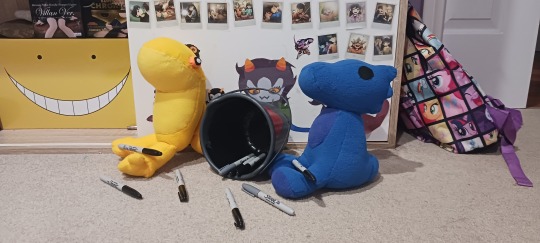
My beautiful casey and scalemate plushies.
Having a bucket of sharpies in your room truly is a homestuck moment.
#homestuck#homestuck fanwork#Homestuck plushie#Casey homestuck#Homestuck casey#Homestuck scalemate#Scalemate#Plushie#Sewing#homestuck plush#Buckets homestuck
12 notes
·
View notes
Text
thinking about doing a month-long event for the homestuck tumblr community to encourage people to make + post fanworks as well as reblog other people's fanworks.... where people can opt-in by being randomly assigned one of two teams (probably red and blue) so that each team has roughly the same amount of members. teams get points for making fanworks and having their posts reblogged, which encourages people to make posts and also reblog the posts made by their team members. and the top 3 people in each team to get the most points get some kind of reward... hmmmm
#if you have thoughts please let me know!!!#just trying to think of ways to encourage sharing fanworks and getting feedback through friendly competition#sort of like artfight but not the same attacking/revenge format. just the same basic idea in mind of encouraging this kind of creativity#for the reblogging to get points i don't think duplicate reblogs would count. to limit spam#but you can reblog multiple times... it just won't get you more points#i don't want it to be too complicated though#i also don't want it to end up limiting reblogs since the other team wouldn't want to reblog...................#this is like very very loose brainstorming here#i'm leaning toward this concept because it encourages people to engage with posts they might normally skip over#like if you don't really care about PM. but if someone posts their PM fanart you might reblog it anyways because they're on your team!#homestuck
220 notes
·
View notes
Text
Space Dogs
(Hey! This fic was also posted on ao3 here, it would mean so much if you could give it a like and/or comment there)
Jade knocked on the outside of the pod and waved. Through the thick paned window, she could see the Russian space dog barking. Both their tails wagged in delight.
In an instant, Jade was in the pod with the dog. “Laika! Hi, oh, hi you! Look at you! You’re so friendly, so nice, you’re such a good dog!”
Laika barked and whined. It had been a day or two since she’d seen anyone. She jumped up onto Jade, sniffing her all over.
“Oh, you are just the sweetest!” Jade squealed. “Your coat is so soft, and you’re just so pretty! Come here!” Jade ruffled Laika’s face around, scratching behind her ears and kissing her nose.
“You know, you remind me of an old friend of mine!” She said, pointing to her ears. “His name was Bec, and he was the best dog a girl like me could ever ask for!”
Jade’s smile faltered, and her eyes saddened somewhat. She shook her head, breaking herself out of her funk. “Here, I brought something for you!” In a flash of green, Jade produced two milkbones, which Laika readily lapped up. “You like those? I have to admit, I’ve tried them myself, and I can see why you like them.”
Jade giggled, and gazed warmly at Laika, who in turn gazed adoringly back up at her. Jade sighed and sit down, patting the spot next to her. “Come here girl, sit with me.” Laika bounded over, circled a few times, and curled up next to Jade, laying her head in the girl’s lap.
Jade pet her head idly. “Oh, you have no idea how long I’ve waited to meet you.” She sighed. “You know, back when I was younger, I would look out the window at night, wondering if you were up there, looking down on me.
“I’ve been obsessed with your story ever since I heard it. A brave creature, off to the unknown, yet ready to face it.” Jade shook her head. “Did you know, girl? That you’d never be able to go back? That you’d simply float out here alone, no one to take care of you?”
Laika didn’t stir. Her breathing was even and steady. She was fed and cared for.
“I don’t think anyone understands what it’s like to be out here. They could have set up radios, screens, hell, even holograms in your pod, but they wouldn’t understand how it feels to be out here forever. Slowly drifting away from everything and everyone you ever knew, the infinity between you only growing bigger.”
Again, Laika didn’t move. Jade simply laughed ruefully. “Of course you didn’t. You’re a dog. Loyal to a fault, doing whatever the people around you think is best. I bet there's no one you want to be with more than them right now. It would be so much easier if everything just went back to the way it was before.”
Jade sniffed, and Laika felt tears drop onto her back. She looked up at Jade, tilting her head. Getting up tentatively, she licked Jade’s face. Through her sobs, Jade laughed. “Good girl, Laika. Gosh, you’re sweet.”
Suddenly, something caught Jade’s attention. She put a finger up to her ear. “What? Dave, please, I only just- to hell with the damn timeline!”
The anger in Jade’s voice made Laika recede for a moment. Jade made a face as if she’d just stepped on the dog’s paw on accident. Reluctantly, she put her hand back up to her ear. “Fine, just… just another minute. Thank you.”
Jade wiped the tears from her face, but they continued to fall. She held her arms out to the dog, who in turn placed her head on the girl’s shoulder. She sobbed into Laika’s coat.
Jade composed herself to the best of her ability. In another flash of green, a small stuffed dog showed up. “Here,” Jade said shakily. “So you’re not completely alone.”
Jade looked Laika once more in the eyes, and she felt true understanding. More than from any of her endless ramblings to her friends, more than from Kanaya, more than from even Calliope. All she could do was break into another wide grin, though tears still streamed down her face. “Thank you, Laika. You are such a good dog.”
She stood up and placed her hand on her ear. “Ok Dave, I’m ready.” In a flash of red, she was gone.
Laika tilted her head at where the girl had been. After a moment, she went to inspect the toy. She curled up and laid her head on it. It smelled like that nice girl.
(If you liked this, drop a like and reblog! It helps so much!)
0 notes
Text
#homestuck#homestuck rewrite#gamzee makara#murderstuck#a5a2#act 5 act 2#rewriting Homestuck#rex duodecem angelus#Homestuck fanwork
2 notes
·
View notes
Text
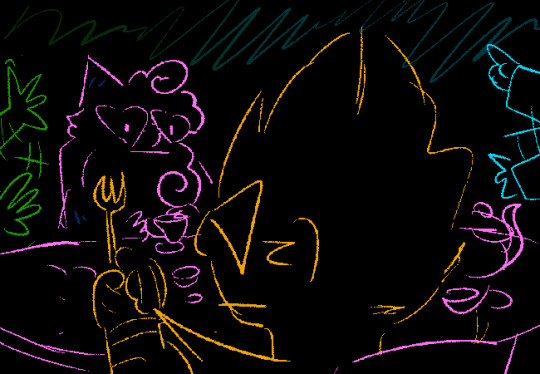
dirk considering relative lethality of the fork
7 notes
·
View notes